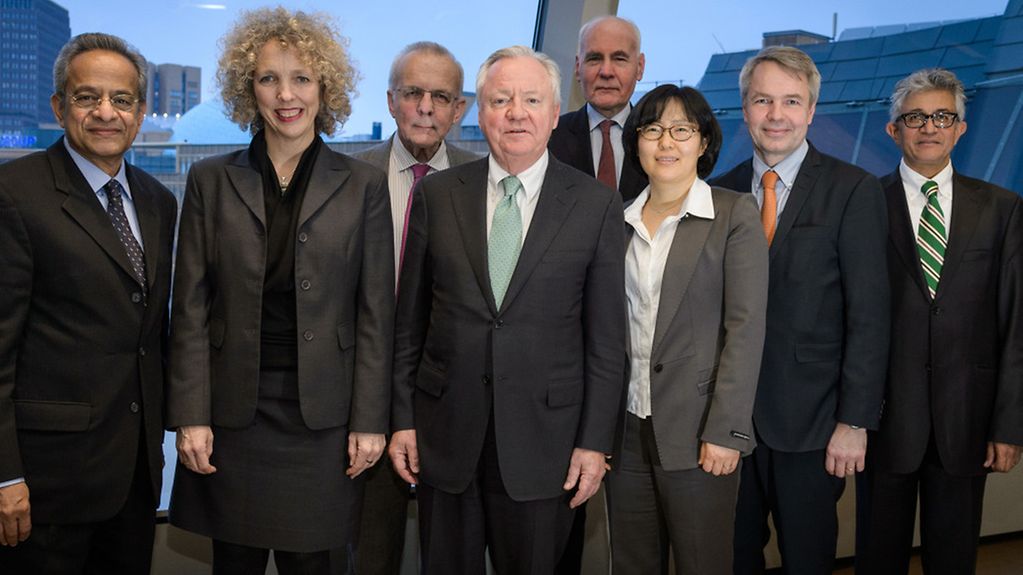Sustainability
Germany can be proud of in what it has achieved so far in its transition towards a more sustainable world. But the journey, however, is not over yet. Much remains to be done. This is the result of peer review.
- German Council for Sustainable Development

Peer group
Photo: André Wagenzik/RNE
The Peers - a group of internationally recognised experts invited by the Chancellor to review the National Sustainability Strategy - delivered the most recent review in September 2013. In that review, they acknowledged the progress made since the first peer review in 2009. They see that a sound basis has been achieved from which Germany can consolidate further. They consider the progress capable of integrating sustainability even more throughout all parts of German government, business and society.
Central recommendations
The peers hence suggest the federal government to proceed onwords in the implemenation of the sustainability policy. Central recommendations include:
- restructuring administrative capacities in the Federal Government, thus providing for a reliable framework for sustainable development
- shaping the Green Economy and introducing more coherent cooperation between the public and private sector
- clear coordination and better planning for the Energiewende transition
- the need to address the social dimension of sustainable development including quality of life and the demographic challenges
- arranging sustainability more systematically into all levels of education
- strengthening research for sustainable development.
The Council for Sustainable Development provided organizasational support, think pieces and stock-taking reports.
Members of the peer review group
Björn Stigson, Prof Dr (Chair of the Peer Group), former President of the World Business Council for Sustainable Development, WBCSD, Visiting Professor Gothenburg School of Business, Economics and Law
Suresh P. Babu, Dr Manager in the Global and Regional Solutions Directorate at the US Department of Energy’s Brookhaven National Laboratory, former CEO and director of technology development for TERI Technologies, Ltd., Delhi, India
Jeroen Bordewijk, Co-founder and first President of the Sustainable Agriculture Initiative (SAI) and former Senior Vice President of Unilever
Pekka Haavisto, Member of the Finnish Parliament for the Green Party, former Finnish Minister of the Environment and Development Co-operation, former EU Special Representative for Sudan and Darfur, former leader of UNEP post-conflict environmental assessments and projects
Valli Moosa, Chair of WWF South Africa, Chairman of Anglo American Platinum and former Minister for Constitutional Development, South Africa
Jennifer Morgan, Director of the Climate and Energy Program of the World Resources Institute, former leader of the Global Climate Change Program of Worldwide Fund for Nature (WWF) and since end of June 2013 member of the German Council for Sustainable Development
Derek Osborn, CB, President of Stakeholder Forum for a Sustainable Future, formerly Director General of the UK Department of the Environment, Chair of the European Environment Agency and Chair of the European Economic and Social Committee’s Sustainable Development Observatory
Sun-Jin Yun, Prof Dr, Professor of Environmental and Energy Policy, Graduate School of Environmental Studies of Seoul National University and former president of a grassroots environmental organization for energy transition, called the Center for Energy Alternatives, South Korea
The beginnings of evironmental performance reviewing
In 1991, the OECD began to produced environmental performance reports for member states. Germany was the first country to undergo a review for this purpose. The country was not afraid of subjecting its performance as regards environmental protection to critical appraisal at an international level. Rather, the federal government was sure the review would provide valuable suggestions for even more improvement.
After 1993 and 2001 the OECD delivered the third "Environmental Performance Review Germany" in 2012. In this review the OECD acknowledged among others the established structures, the concept of the National Sustainability Strategie as well as the implications drawn further law implementation. The OECD pointed out the inclusion of non-governmental stakeholders.